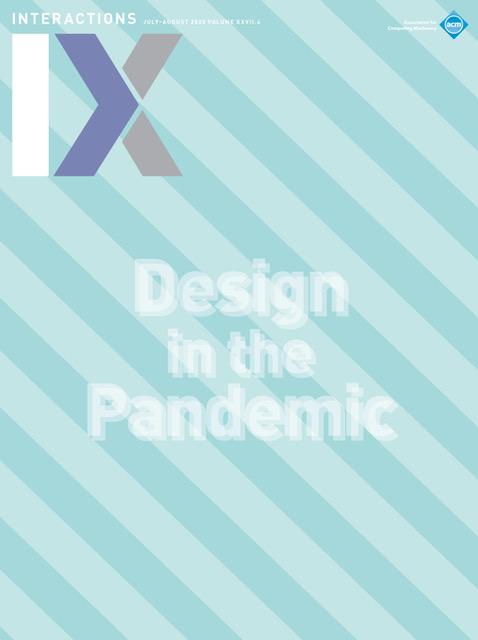Technology designers from around the world discuss how we must respond in academia, industry, family life, and more

Credit: Association for Computing Machinery
ACM, the Association for Computing Machinery, today announced the publication of a special COVID-19 issue of Interactions, ACM’s magazine focused on human-computer interaction (HCI). The special issue of Interactions–Design in the Pandemic–explores the ways in which critical research and emerging practices in HCI and interaction design are being applied to address societal challenges presented by the current pandemic.
“From the early days of the coronavirus outbreak, interactive technology has been entangled in a broad range of responses and played into difficult and in some cases deeply troubling social issues,” said Interactions Co-EIC Alex Taylor, City, University of London. “In this special issue, we sought to capture a snapshot of both the varied responses–the work many have been involved in to keep life going–and the difficult issues we need to address. What I’m most proud of throughout the contributions these authors have generously made is their thoughtful and sensitive insights into the relations between people and technology, and the care given to the profound challenges we face in designing technology to make life better, in the midst of the pandemic and in its aftermath.”
As COVID-19 presents challenges for all facets of society, the HCI community responded by developing new ways of working and inventive approaches to addressing the emerging challenges. In their call for articles, Interactions Co-Editors-in-Chief sought immediate thoughts, reflections, and responses to the crisis from the broad expertise in their research community. The articles published in this special issue of Interactions identify and help answer critical questions, such as how to continue with design work and scholarship in these times; how the HCI community and design more broadly should adjust and respond; and what might be more equitable ways of approaching design and building technologies in light of COVID-19.
Computing researchers, scientists and technologists from around the world contributed ground-breaking articles for the special Interactions COVID-19 issue, including:
- “After the Iron Horse: COVID-19 Responses in Education”
- “The Emerging Need for Touchless Interaction Technology”
- “What Is the Future of Data Sharing for Research*”
- “Evaluating Immersive Experiences During COVID-19 and Beyond”
- “We Need to Talk about Digital Contact Tracing”
- “The Best Tech for Contact Tracing* Systems Designed for Healthcare Workers”
“The articles in this special issue cut across many of the problems facing a broad range of areas, including education, design, sustainability, charities, textiles, family life, healthcare workers, and so much more,” added Interactions Co-EIC Mikael Wiberg, Umeå University, Sweden. “The makers, practitioners and researchers that make up our membership are engaged in creative work that seeks to push the boundaries of human-computer interaction research. With so much unpredictability in the world right now, we felt an issue focused on COVID-19 would be an apt way to reflect, ask questions, and respond to the pandemic with the unique perspectives that our industry offers.”
To organize contributions to this special issue, Interactions editors organized the 27 articles into four sections:
- An Unusual Business
- What We Knew Then… And What We Know Now
- A Responsive Kind of Design
- Just Futures
Published bimonthly, Interactions is circulated to all members of SIGCHI, ACM’s Special Interest Group on Computer-Human Interaction. The magazine includes a multiplicity of conversations, collaborations, relationships and new discoveries focusing on how and why we interact with the designed world of technologies.
“The devastating and uneven upheaval created by COVID-19 is continuing to unfold across the globe, and we have little idea what the future may hold,” said Interactions Co-EIC Daniela Rosner, University of Washington. “What we do know is that the novel coronavirus is contributing to, and even deepening, disparities along existing lines of inequality–emboldening the two additional pandemics of anti-Black racism and economic crisis. We see the work of SIGCHI members as actively challenging these developments and trying to offer, even in small ways, hope for building more just and equitable worlds.”
###
About ACM Interactions
ACM Interactions magazine is a mirror on the human-computer interaction and interaction design communities and beyond, with a focus on how and why we interact with the designed world of technologies. Interactions has a special voice that lies between practice and research with an emphasis on making engaging human-computer interaction research accessible to practitioners and on making practitioners’ voices heard by researchers.
About ACM
ACM, the Association for Computing Machinery, is the world’s largest educational and scientific computing society, uniting educators, researchers and professionals to inspire dialogue, share resources and address the field’s challenges. ACM strengthens the computing profession’s collective voice through strong leadership, promotion of the highest standards, and recognition of technical excellence. ACM supports the professional growth of its members by providing opportunities for life-long learning, career development, and professional networking.
Media Contact
Jim Ormond
[email protected]
Original Source
https:/




